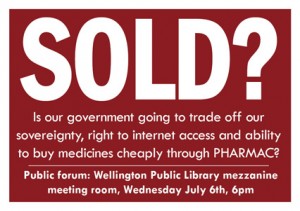
...that's the way you do on the M. T. V.
I’ve been watching developments with the proposed Trans Pacific Strategic Economic Partnership Agreement (TPP) between the United States, New Zealand, Brunei, Australia, Chile, Singapore, Peru, Vietnam, Canada, Mexico and Malaysia. Japan, Korea, Taiwan and the Philippines have also expressed interest in joining.
The TPP negotiations have been largely held in private so people here in New Zealand have only a small idea of what our government is putting out on the table as negotiating chips. The same is apparently true in the U.S. and and I would strongly suspect it is also true in the other negotiating countries.
Trouble in America
In the U.S., various groups are speaking out against the TPP.
In May 2012, a group of 30 legal scholars, critical of the Office of the United States Trade Representative‘s “biased and closed” TPP negotiation process and proposed intellectual property-related provisions, publicly called upon Ambassador Kirk to uphold democratic ideals by reversing the “dialing back” of stakeholder participation and to release negotiating texts for public scrutiny.
On May 23, 2012, United States Senator Ron Wyden introduced S. 3225, proposed legislation that would require the Office of the United States Trade Representative to disclose its TPP documents to all members of Congress. Senator Wyden said,
“The majority of Congress is being kept in the dark as to the substance of the TPP negotiations, while representatives of U.S. corporations—like Halliburton, Chevron, PHRMA, Comcast, and the Motion Picture Association of America—are being consulted and made privy to details of the agreement. […] More than two months after receiving the proper security credentials, my staff is still barred from viewing the details of the proposals that USTR is advancing. We hear that the process by which TPP is being negotiated has been a model of transparency. I disagree with that statement”.
Let’s get that straight. Halliburton, Chevron, PHRMA, Comcast, and the Motion Picture Association of America can all see the current texts of the negotiations – and we cannot?
Trouble in New Zealand

At a public forum on 6 July 2011, legal experts in New Zealand presented their concerns that the agreement could undermine law regarding Maori culture, genetic modification, copyright, and remove the subsidized medicine New Zealanders have access to through Pharmac.
More about this in a moment.
The Investor-state arbitration provisions
But perhaps the most worrying of the potential problems are the Investor-state arbitration provisions of the TPP that have been revealed from leaked documents. This is from the Wikipedia article on the TPP:
The leaked draft treaty also caused a stir among anti-globalization groups that are opposed to investor-state arbitration, which permits foreign investors to bring claims directly against states before panels of trade arbitrators if they perceive public policy or legislative actions have expropriated their property or treated their investment (defined broadly enough to include most forms of intellectual property) “unfairly”. Those groups and other critics of the investment protection regime argue that traditional investment treaty standards are incompatible with environmental law, human rights protection, and public welfare regulation, meaning that TPP will be used to force states to lower standards for e.g. environmental and workers protection – or be sued for damages. As a worst case scenario, investor-state arbitration gives transnational corporations powers to trump the sovereign powers of nations and states and hold back important policy developments related to sustainability and a clean energy future. The Australian government and its negotiators have stated that they will not be agreeing to investor state dispute settlement provisions that give greater rights to foreign than domestic businesses in the TPP.
So, what’s the worry?
Well, just considering the Investor-state arbitration provisions, one can see that if New Zealand enters into these agreements and then later NZ, for example, wants to legislate that cigarette packages have to be plain with no advertisements and with bold warnings about the health risk, then the tobacco companies in the U.S. could sue us for damages under these provisions.
They would say that our new legislation undercut their profits from selling cigarettes and thus we’d hurt their financial interests. Does that sound like something any country should open itself to?
Governments should be free to make whatever legislation they see fit for the betterment of their own people. That’s what being a sovereign nations is all about, really.
In this proposed situation, government decisions would be checked by their possible economic consequences on the economic interests of foreign corporations.
Canada puts its willy in the Wringer

Canada
Canada has signed a new agreement that comes into effect at the end of October. It’s called The Canada-China Foreign Investment Promotion and Protection Act (FIPPA). It seems to be a model of what not to do to me.
In one instance, it prevents Canada from doing anything that will infringe on Chinese profits from the Enbridge Northern Gateway pipeline. These limitations will continue for 31 years.
In an article from the Vancouver Sun it says:
“This treaty, in effect, will pre-empt important elements of the debate of the Northern Gateway pipeline and may frustrate in a very significant way the ability of the current BC government or any future government—if the NDP were to win in spring—from stopping that pipeline or bargaining a better deal for BC,” said Gus Van Harten, an Osgoode Law professor who specializes in international investment law.
Van Harten noted that arbitrators in foreign investment agreement disputes will most likely judge in favour of Chinese investors in cases where the host country attempts to impose new or updated regulations that may interfere with the investor’s bottom line.
“If this treaty comes into effect, and there’s any Chinese ownership whatsoever in assets related to this pipeline—minority ownership, ownership we generally don’t know about—then Canada will be exposed to lawsuits under this treaty, because the BC government will be discriminating against a Chinese investor, which is prohibited by the treaty.”
The treaty will protect investors’ rights for 31 years as of November 1.
Some sense?
I can see that corporations who make significant international investments in infrastructure will want to control things to protect their investments and to guarantee their profits. These are corporations, after all, so such behaviors should be expected without question.
But why would sovereign governments want to sign negotiations that will limit their ability to make laws that are in the best interests of their own peoples?
Could it be (gasp) money?
Who’s making the deals – who are they?
When I first started considering all of this, I had a hard time wrapping my head around the idea that anyone negotiating on behalf of a sovereign government could possibly think treaties like this would be a good idea.
Then the light turned on when I thought about who our negotiators are.
Who is it these days who have risen so high in national governments that they have a seat at the table where such negotiations are done?
Business people, my friends, usually it is business people.

Trans Pacific Partnership
Here in New Zealand, we are led by John Key in a conservative government which is very business-friendly.
Canada is currently led by the Harper government of which we could very much say the same.
And the United States, as I’ve asserted for some time, has basically been captured by, and is largely under the control of, corporations and their minions; the business people.
Do you begin to see?
So, John Key is a major businessman here in New Zealand. A millionaire who has made his money through business.
So, if he leads a negotiating team to the TPP negotiations that is willing to put our subsidized pharmaceuticals (PHARMAC) on the table as a negotiating chip, then he’s put something out there that the other side (big Pharma in the U.S.) would like. And that’s free access to our NZ markets where they can sell us our pharmaceuticals for the same outrageous prices they sell them to the U.S. public for.

Unequal contest

John Key
In exchange, John Key, and the other business types he’s allied with here in New Zealand, will get access to new offshore markets through the TPP where they can sell the sorts of things they like to do business in.
In the end, by negotiating away something that belongs to all of us in New Zealand (PHARMAC), they will reap huge personal profits.
Now, they will say that some of that new money they will make will ‘trickle-down‘ into the pockets of other New Zealanders and that we will all be better off for it in the end.
Yeah right! It’s been a long time since I’ve believed in ‘trickle-down’ anything other than political bullshit. Trickle-down is just a conscience-saving mental ploy of the rich to try to make their profiting at our expense more palatable.
The new face of how corporations dominate governments
Is through international free trade agreements. Watch for it – coming to nation like yours soon.









